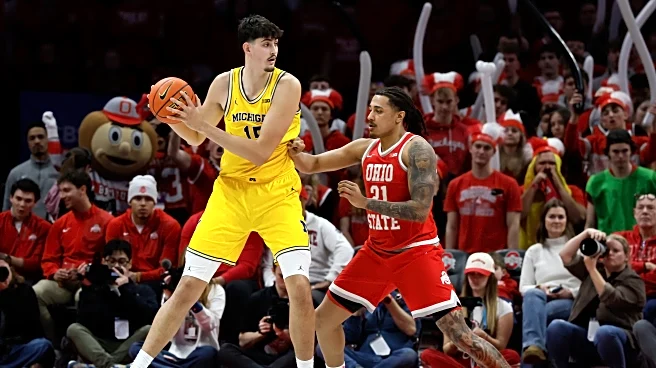What's Happening?
The Sora app, a new short video platform developed by OpenAI, has rapidly gained popularity, reaching over a million downloads within a week of its launch. The app allows users to create hyperrealistic, AI-generated videos, leading to a surge in content
that blurs the line between reality and fiction. Users can superimpose faces onto existing videos and generate content featuring deceased celebrities and fictional characters. This has raised concerns about the erosion of trust in digital content, as well as issues related to copyright and the unauthorized use of likenesses. OpenAI initially allowed the re-creation of copyrighted material by default, but following backlash, it has promised to give rights-holders more control over their characters' use in AI videos.
Why It's Important?
The rise of AI-generated content on platforms like Sora poses significant challenges to digital trust and copyright enforcement. As users struggle to distinguish between real and synthetic content, there is a risk of misinformation and manipulation. This development has implications for industries reliant on intellectual property, such as entertainment and media, as well as for public figures whose likenesses may be used without consent. The situation highlights the need for robust legal frameworks and technological solutions to protect digital identities and ensure fair compensation for the use of likenesses. The controversy also underscores the broader societal impact of AI technologies on perceptions of reality and authenticity.
What's Next?
In response to the growing concerns, OpenAI has announced plans to enhance control for rights-holders and explore revenue-sharing models. The company is also implementing stricter content policies to prevent unauthorized use of copyrighted characters. Meanwhile, organizations representing deceased celebrities are partnering with deepfake detection companies to monitor and protect digital likenesses. As legal and ethical debates continue, stakeholders across industries are likely to push for clearer regulations and technological safeguards to address the challenges posed by AI-generated content.
Beyond the Headlines
The proliferation of AI-generated videos raises ethical questions about the appropriation of personal and cultural identities. The ability to create realistic depictions of individuals without their consent could lead to reputational harm and emotional distress. Additionally, the technology's potential use in creating misleading or harmful content poses risks to public discourse and democratic processes. As AI continues to evolve, society must grapple with the balance between creative freedom and the protection of individual rights.
















